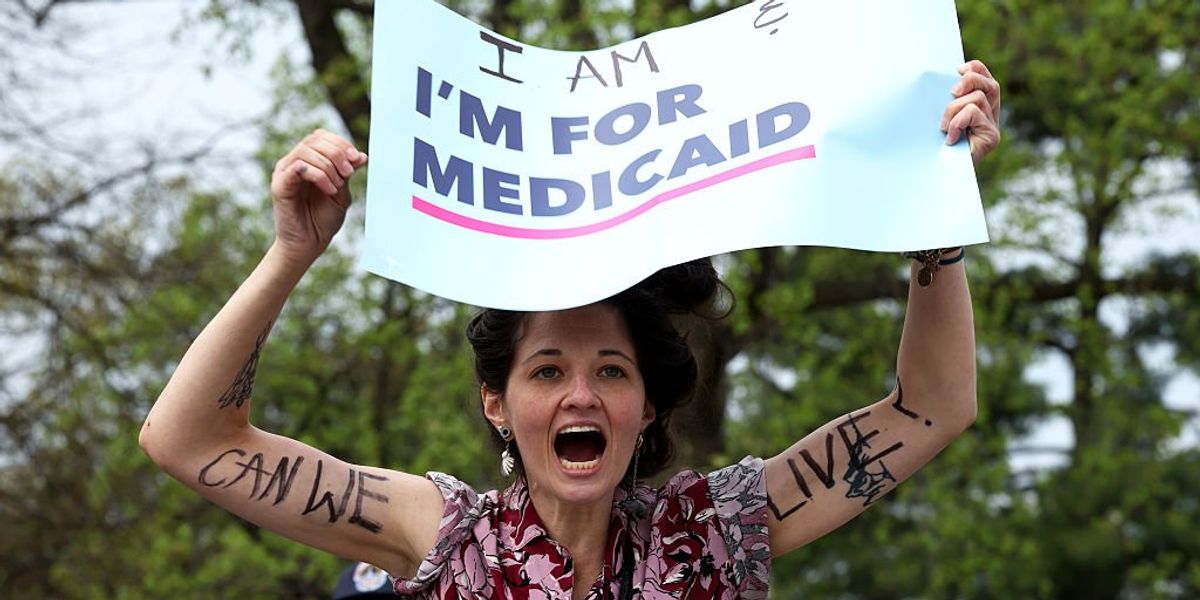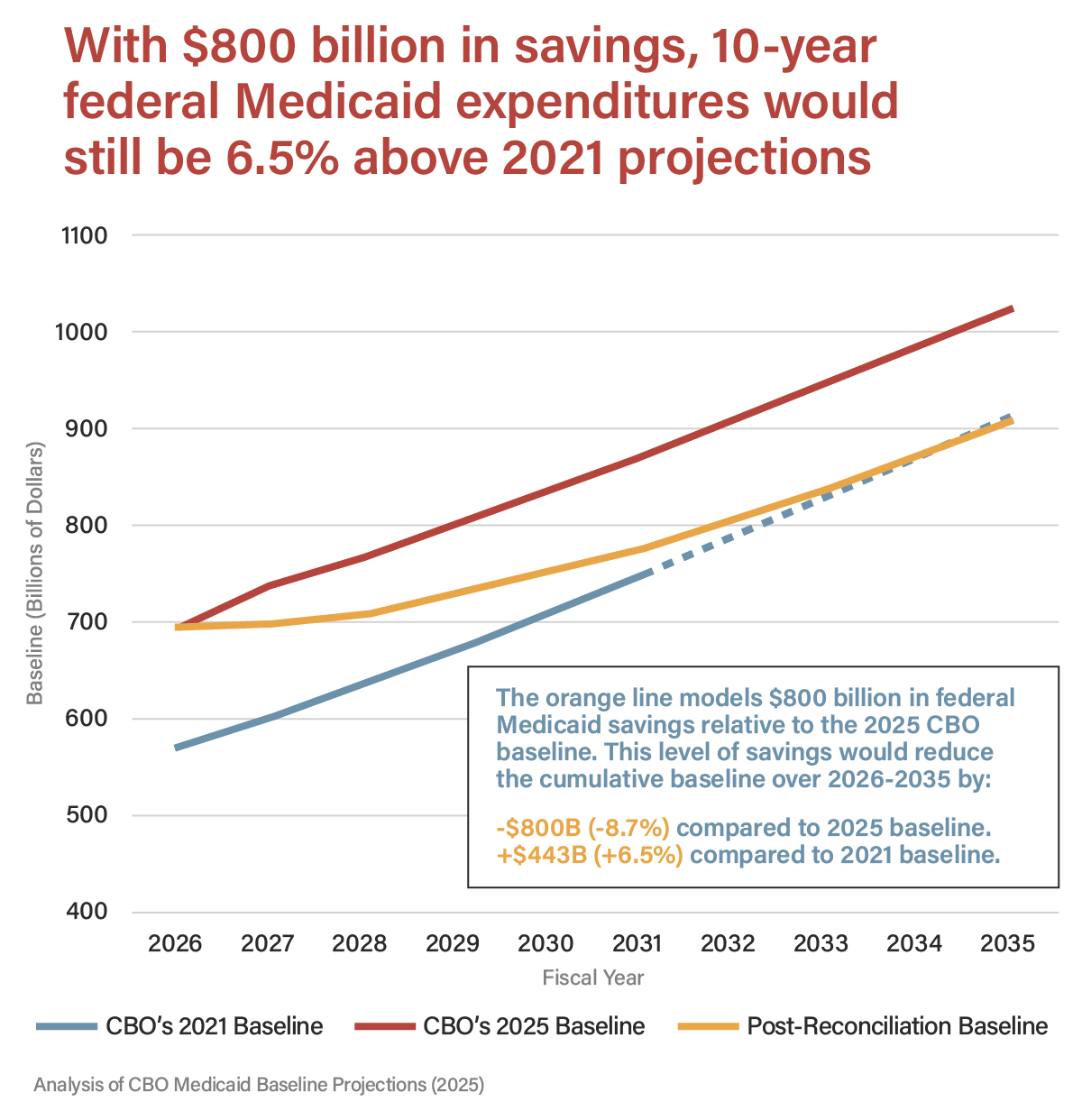

No program has done more to drive up health care costs and balloon inflationary debt than Medicaid. Yet the same Republicans who railed against “Bidenflation” on the campaign trail now draw a red line against even modest reductions in Medicaid’s explosive growth — reforms that would merely return spending to projections made at the start of Joe Biden’s presidency.
A dozen House Republicans sent a letter to Energy and Commerce Committee Chairman Brett Guthrie (R-Ky.), warning they would oppose any reconciliation bill that trims Medicaid. “We cannot and will not support a final reconciliation bill that includes any reduction in Medicaid coverage for vulnerable populations,” wrote Reps. David Valadao (Calif.), Don Bacon (Neb.), Jeff Van Drew (N.J.), Rob Bresnahan (Pa.), Juan Ciscomani (Ariz.), Jen Kiggans (Va.), Young Kim (Calif.), Rob Wittman (Va.), Nicole Malliotakis (N.Y.), Nick LaLota (N.Y.), Andrew Garbarino (N.Y.) and Jeff Hurd (Colo.).
Over the next decade, the program will cost $8.6 trillion under current projections. The Congressional Budget Office expects the federal share to reach $1 trillion annually by 2034.
These lukewarm Republicans object to the House’s reconciliation framework, which directs Guthrie’s committee to identify roughly $80 billion in annual savings — most of which would come from Medicaid. Trump already agreed in principle to these reductions in discussions with the House Freedom Caucus. The plan would save about $1.5 trillion over a decade.
Still, neither President Trump nor Speaker Mike Johnson (R-La.) has shown any appetite for rolling back the Obamacare Medicaid expansion — or the pandemic-era expansion that added yet another category of able-bodied adult males to the eligibility rolls.
So what are these Republicans really opposing? Even work requirements for able-bodied adults. They hide behind mealy-mouthed language, but the message is clear: they won’t support basic accountability measures for a program draining the federal budget at record speed.
Naturally, the RINOs fall back on the same tired line about supporting “targeted reforms to improve program integrity, reduce improper payments, and modernize delivery systems.” This vague bureaucratic jargon helped create today’s bloated Medicaid system — with worse health outcomes to show for it.
In practice, Medicaid drives inflation across the economy and accelerates health care cost growth. Despite the staggering spending, the program has produced little beyond declining life expectancy and growing numbers of doctors refusing to accept Medicaid patients. It’s the health care equivalent of the Department of Education — massive funding, dismal results.
At the end of the Clinton administration, Medicaid enrollment stood at 34.5 million, with annual costs of $117 billion. Today, including the Children’s Health Insurance Program, enrollment has soared to 80 million. In fiscal 2023, total Medicaid spending hit $880 billion. The federal government paid $606 billion (69%), while states covered the remaining $274 billion (31%).
In most states, Medicaid ranks as either the top or second-highest budget item.
The fiscal outlook is even worse. In fiscal year 2025, the federal government alone is projected to spend $656 billion on Medicaid. Over the next decade, the program will cost $8.6 trillion under current projections. The Congressional Budget Office expects the federal share to reach $1 trillion annually by 2034.
This is unsustainable — and yet both parties continue to treat reform as political poison.
If Social Security, Medicare, the military, and the VA remain off-limits — as both parties insist — then Medicaid is the only major program left where Congress can find real savings. Anyone who claims to care about federal spending while blocking Medicaid reform is lying.
And let’s be clear: No one is proposing actual cuts to Medicaid.
The House reconciliation plan simply reins in projected growth, returning it to the levels the Congressional Budget Office forecast in 2021. That’s not austerity — it’s basic fiscal sanity. Under Biden, annual Medicaid costs ballooned by more than $100 billion in just a few years.

Paul Winfree, Trump’s former director of budget policy, noted that in 2024, federal Medicaid spending ran 23% higher than early Biden-era projections. Obamacare spending exceeded projections by 129%. In contrast, Medicare spending rose just 4%.
If Congress held Medicaid growth to the same rate as Medicare, the “savings” would exceed what the Freedom Caucus is currently demanding. That’s not a cut — it’s common sense.
At the very least, Trump should insist on strict work requirements for able-bodied adults receiving Medicaid. According to the Foundation for Government Accountability, more than 60% of able-bodied adult enrollees report no earned income.
That’s indefensible.
Trump has pushed the Freedom Caucus hard to support the reconciliation bill. He owes it to the public to apply just as much pressure on the GOP moderates shielding Medicaid from even modest reforms.
It’s time to overhaul our entire approach to Medicaid. The program keeps growing, yet more doctors refuse to accept it, thanks to low reimbursement rates. Meanwhile, managed care companies rake in billions.
Take Molina Healthcare. Nearly all its revenue comes from government contracts, mostly Medicaid managed care. Its CEO, Joseph Zubretsky, is the highest-paid insurance executive in the country. That’s not health care — that’s grift.
Congress should repeal Obamacare and allow for real choice and competition in the insurance market. With that freedom, the government could directly subsidize health savings accounts for people in need — so they can buy private plans without the stigma, delays, and denial of care that plague Medicaid managed care.
We should also expect modest contributions from most enrollees — just as Medicare does. Exempt the truly destitute, of course. But the idea that anyone just below the income threshold should pay nothing, while those just above it face crushing Obamacare premiums, defies fairness and common sense.
Most Medicaid recipients own smartphones and cars. Many spend hundreds on repairs without government help. No one expects them to cover major medical bills. But asking for a small monthly premium isn’t cruel — it’s responsible.
Earlier this month, Trump rightly noted that in 1870, tariffs funded nearly the entire federal government. But back then, the U.S. didn’t have a welfare state.
If Trump wants to revive 19th-century fiscal discipline, he must let go of this bizarre loyalty to a Medicaid system that mostly enriches managed care executives — and leaves taxpayers and patients holding the bag.
















